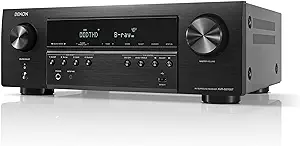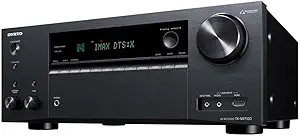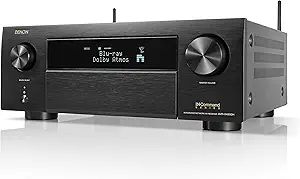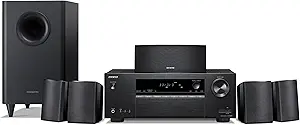The Onkyo AV receiver and Denon AV receiver are both reputable brands in the audio equipment industry, each with its unique features and technological advancements. Onkyo AV receivers are known for their high-resolution audio support and dynamic audio amplification. They utilize technologies such as THX Certified Select for theater-reference sound and AccuEQ Advance for room acoustic calibration. On the downside, some users have reported issues with the HDMI board, which may affect the longevity of the device. On the other hand, Denon AV receivers are recognized for their exceptional sound quality and advanced features, including 3D audio formats like Dolby Atmos, DTS:X, and Auro-3D. They also boast HEOS technology for multi-room audio and Audyssey MultEQ for room acoustic measurement and correction. However, Denon receivers are often more expensive than their Onkyo counterparts, which may be a deterrent for some buyers. Comparatively, both brands offer excellent audio performance, but Denon tends to have more edge in terms of advanced features and technologies.
Key Features Comparison
Product Selection
Onkyo and Denon AV receivers are both reputable brands in the audio equipment industry, each with a broad product selection that caters to different user needs. Onkyo AV receivers are known for their high-quality sound performance, featuring the latest technologies such as Dolby Atmos, DTS:X, and THX Certified Select for a cinematic audio experience. They also offer a range of models from entry-level to high-end, allowing customers to choose based on their budget and requirements. However, some users have reported reliability issues with Onkyo receivers, which may affect the brand's overall reputation. On the other hand, Denon AV receivers are recognized for their exceptional audio quality and innovative features such as HEOS multi-room technology, Audyssey MultEQ room calibration, and support for the latest video standards including 8K and HDR. Denon's product selection is also diverse, with models designed for both home cinema enthusiasts and professional audio engineers. However, Denon receivers are generally more expensive than Onkyo, which may be a deterrent for budget-conscious customers. Compared to other brands, both Onkyo and Denon offer a wider product selection, but Denon is often praised for its superior build quality and advanced features.
Availability
Denon and Onkyo are two well-established brands in the audio equipment market, known for their AV receivers. In terms of availability, both brands have a wide distribution network globally. Denon AV receivers are readily available in most electronics stores and online platforms such as Amazon, Best Buy, and the company's own website. They offer a range of models to cater to different customer needs, from entry-level to high-end, and regularly update their product line with the latest technologies such as 8K support, Dolby Atmos, and HEOS multi-room audio. On the other hand, Onkyo AV receivers are also widely accessible through similar channels, including physical stores and online retail giants. Onkyo, too, has a broad product portfolio that spans from budget-friendly to premium models, incorporating cutting-edge technologies like THX Certified Select, Dolby Atmos, and DTS:X. However, it's worth noting that Onkyo has faced some supply chain issues in the past, which has occasionally impacted the availability of certain models. Despite this, both Denon and Onkyo maintain a strong presence in the AV receiver market, and their products are generally easy to find for consumers globally.
Design/Look
When it comes to the design aspect of audio equipment, both Onkyo and Denon AV receivers have their unique styles and functionalities. The Onkyo AV receiver is known for its robust and sturdy design, featuring large and easy-to-use knobs and buttons. The latest models come with a clean, sleek front panel and a well-organized back panel, making it easier for users to connect various audio devices. On the downside, some users have mentioned that the Onkyo's design is somewhat bulky compared to other brands, which may not be ideal for those with limited space. On the other hand, Denon AV receivers are recognized for their minimalist and modern design. The front panel is typically streamlined with fewer buttons, relying more on the on-screen interface for control. The back panel is also well-labeled and easy to navigate for setup. Denon's latest models, such as the Denon AVR-X3700H, even come with a built-in HEOS technology for wireless music streaming, adding to its sleek design. However, some users have pointed out that the minimalist design could be a drawback as it requires more reliance on the remote control or app for operation. In comparison to Onkyo, Denon AV receivers are usually more compact and lightweight, making them a better fit for smaller spaces.
Affordability
Most affordable brands
When comparing the price of Onkyo and Denon AV receivers, it's important to consider the features and technologies each brand offers. Onkyo AV receivers are generally priced lower than Denon, making them a more affordable option for those on a budget. They also offer features such as Dolby Atmos and DTS:X support, 4K Ultra HD pass-through, and built-in streaming services. However, some users have reported issues with Onkyo's reliability and customer service. On the other hand, Denon AV receivers are typically more expensive, but they offer advanced technologies that justify the higher cost. These include Audyssey MultEQ room correction, HEOS multi-room audio, and eARC support for high-quality audio from your TV. Denon is also known for its high-quality build and excellent customer service. While the price may be a deterrent for some, many users find the additional features and superior build quality of Denon receivers to be worth the extra cost. Compared to other brands, both Onkyo and Denon offer competitive pricing, with Onkyo being a more budget-friendly option and Denon offering high-end features at a premium price.
Quality/Durability
Onkyo AV Receivers are well-known for their robust build quality and long-lasting durability. They are equipped with the latest technologies such as Dolby Atmos, DTS:X, and HDMI support for 4K/60 Hz, HDR, and BT.2020, which provide a high-quality audio experience. Onkyo receivers are also built with high-current amps that ensure accurate control of the speakers for precise, dynamic audio reproduction. However, some users have reported issues with HDMI board failures, which could be a potential drawback in terms of durability. On the other hand, Denon AV Receivers are also renowned for their quality and durability. They are equipped with advanced technologies such as HEOS wireless multi-room audio technology, Alexa voice control, and support for Dolby Atmos, DTS:X, and Auro-3D. Denon receivers are also recognized for their solid build, with a vibration-resistant design that reduces the adverse effects of heavy components within amplifiers so that the sound quality meets Denon's high standards. However, some users have reported issues with the user interface and network connectivity, which could impact the overall user experience. Compared to Onkyo, Denon AV receivers generally have a reputation for better reliability and fewer issues with component failures.
Reputation
Onkyo and Denon are two of the most reputable brands in the audio equipment industry, particularly known for their AV receivers. Onkyo, a Japanese brand, has a long-standing reputation for delivering high-quality sound and advanced features. Their latest models incorporate technologies such as Dolby Atmos, DTS:X, and THX Certified Select for immersive, cinema-like sound. However, some users have reported issues with the HDMI boards in certain models, which can affect the overall performance and longevity of the product. On the other hand, Denon, also a Japanese brand, is renowned for its high-fidelity audio equipment. Their AV receivers are praised for their exceptional sound quality, robust build, and innovative features. The latest Denon models come equipped with technologies like Audyssey MultEQ XT32, AL32 Processing, Dolby Atmos, and DTS:X for a superior audio experience. They also support 8K/60Hz and 4K/120Hz pass-through, making them future-proof. Denon's reputation is slightly marred by their higher price point and some users find their user interface less intuitive compared to other brands. Comparatively, both brands have a strong reputation in the audio industry, but the choice between the two often comes down to personal preference and budget considerations.
Conclusion
Onkyo and Denon AV receivers are both highly respected in the audio equipment industry, each offering their unique strengths. Onkyo AV receivers are known for their high power and dynamic audio performance, with the latest models featuring technologies such as Dolby Atmos, DTS:X, and THX certification. They also offer HDMI support and a user-friendly interface. However, some users have reported issues with the durability of Onkyo receivers, which may affect their long-term performance. On the other hand, Denon AV receivers are renowned for their exceptional sound quality and advanced features. The latest Denon models come equipped with technologies such as HEOS wireless multi-room audio, Audyssey room correction, and support for high-resolution audio formats. They also offer a more extensive selection of inputs and outputs compared to Onkyo. However, Denon receivers are generally more expensive, and their user interface can be complex for beginners. Compared to other brands, both Onkyo and Denon stand out for their commitment to high-quality audio performance and cutting-edge technologies.




















